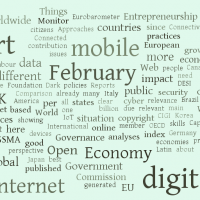 Enrique Medina
Enrique Medina
Last 3th of October the European Commission unconditionally approved in Phase 1 the purchase of WhatsApp by Facebook.
Firstly, it is surprising that a concentration affecting 1,7 billion user worldwide and 300 million user in Europe could have not even been analyzed by Brussels. Not exceeding the thresholds of the EU Merger Control Regulation, based on the companies’ turnover, Facebook did not have an obligation to notify the merger to the European Commission. It was finally analyzed by the Commission only due to the referral system of the EU Merger Control Regulation. This is in stark contrast with the last merger cases in the telecom sector, for example the purchase of O2 Ireland by Hutchison –companies with only 2M clients jointly-, which suffered a strict scrutiny in a procedure lasting more than one year finished with the imposition of stringent remedies to achieve the clearance.
The current system, with turnover as the only threshold to generate an obligation to notify, forgets Internet reality: the value of the data assets in the two-sided markets (business models based in providing free services in exchange of personal data which are used to generate advertising revenues paid by third companies).
Why would Facebook pay US$ 19.000 M for a company with an annual turnover of approximately US$ 20 M if it was not for the value of its customer data? Shouldn’t we re-think the application of those thresholds to the digital markets being the value of the data a variable to be considered? Some German Ministers, in a recent letter to the European Commission, manifested the same worries about the value of customer data and the way to include it in the merger control thresholds, especially in cases related to big digital companies like this one.
Secondly, a Phase 1 clearance was also surprising taking into account the interesting debates that the merger opened. It was the first opportunity for the Commission to closely analyze social networks, instant messaging (IM) and other services like on-line gaming or e-commerce, and to acquire more knowledge about the functioning of the previously analyzed market for on-line advertising. Even the Competition Commissioner acknowledged that this merger raised “challenging questions ranging from market definition in communication services, potential competition, and the role of data in the competitive analysis”.
It is difficult to understand why the Commission has not taken advantage of this great opportunity to analyze those questions. Many stakeholders, Telefónica among them, are convinced that best decision would have been to open a Phase 2, for the following reasons:
– Markets defined. The Commission faced a dilemma between considering social networks as a separate market different from the customer communications applications (IM and similar services) or defining a unique market where the merging parties would compete. Technologic evolution and usage profiles are driving to the convergence of both types of services. Chats previously placed in social networks are being transferred to IM tools: users exchange each time more text messages, videos, photos and even voice through WhatsApp, at the expense of Facebook.
Consumer communications apps are substituting social networks. In some way, they can also be considered as complementary services as some consumers have both services simultaneously available in their devices. It is difficult to decide between the complementary or substitutable effects as even if both services could be simultaneously available, it could be that consumers do not use both or do not use them with the same intensity. An in depth analysis is needed to check if both companies are competing in the same market. However, the Commission decided not to do it and leave the debate open considering that the competitive analysis would be the same in both cases.
We strongly disagree with this view as being Facebook and WhatsApp competitors in the same market the anticompetitive effects would obviously be more serious.
– The affectation to the effective competition. It does not matter if one or two markets are defined. In both cases, anticompetitive effects could be serious. If separate markets were defined, two operators with dominant positions in their respective markets would be merging; they would have the ability and the incentives to leverage in each other dominances and reinforce them. If a unique market were defined, Facebook would be purchasing its main competitor. In both cases, network effects –the more users in the platform/ecosystem the more value it has for each user-, together with the lack of interoperability and data portability, would reinforce the lock-in effects and restrict competition.
The Commission does not share this view because its analysis is too simplistic and is not supported with details or data:
i) not adequate analysis of market shares and positions is done;
ii) Facebook and WhatsApp are not considered competitors forgetting that they offer the same functionalities while this factor was recognized by the Commission as one of the main drivers in the competitive dynamics of those markets;
iii) the Commission, without a detailed analysis, underestimates the network effects in those markets due to mitigating factors (without talking into account the lack of interoperability and data portability);
iv) the possible integration of both services is also underestimated because it is considered unlikely, based in unreliable data and arguments. In consequence, a Phase 2 should have been opened to tackle a detailed analysis in order to determine if the merger could generate those effects.
– Finally, the not negligible affectation to other markets as the online advertising or the Operating Systems.
Facebook position in the online advertising market would be highly reinforced thanks to WhatsApp acquisition by obtaining access to the data of approximately 600 million users. Facebook is the second player in the worldwide online advertising market and would enjoy a dominant position if a narrower market of online advertising in social networks were defined (highly likely due to the extraordinary capacity of targeting that the online advertising offers in the social networks), but the Commission preferred to leave it open without any analysis under such definition. Other markets such as on-line gaming, e-commerce or data-related markets are not analyzed either.
Mobile Operating Systems market is definitively affected by applications like WhatsApp, considered a “must have” by the users, based on the mentioned network effects. In a duopoly market, controlled by iOS and Android, the availability of a “must have” app like WhatsApp (now in Facebook’s hands) could be the determinant element for the success of a new OS like Firefox for example. Those effects should have been analyzed in detail but the Commission has not even mentioned it.
Even admitting the likelihood of a clearance also at the end of a Phase 2, did not these questions deserve an in depth analysis by the Commission?








